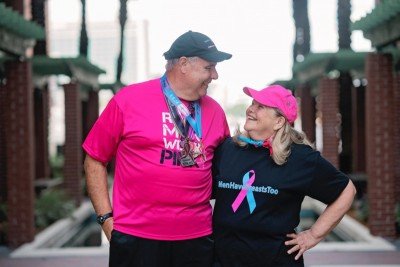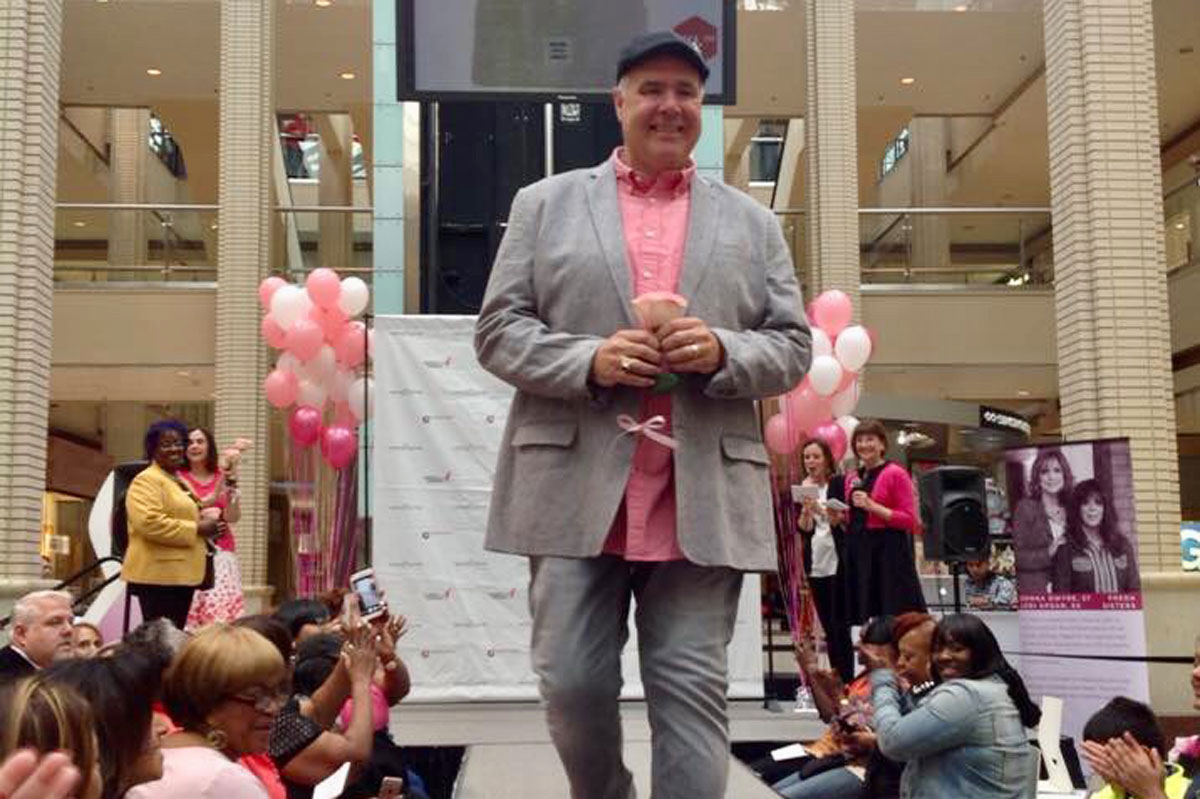Jim Didn’t Know That Men Could Get Breast Cancer — Until He Was Diagnosed
Jim Keegan was diagnosed with breast cancer in 2013. Since undergoing treatment at Memorial Sloan Kettering, he has become a fierce advocate for male breast cancer awareness.

One night in May 2013, Jim Keegan’s wife was running her hand along her husband’s chest when she felt a lump. It gave them both pause.
“It didn’t feel like an ingrown hair,” says Jim, now 71. “It had a different texture. I said, ‘We better go see our family doctor.’ ”
Their doctor in northern New Jersey agreed that the lump felt suspicious and ordered a mammogram. Jim had never heard of a man getting a mammogram before.
“That was certainly surprising, but I didn’t have an alternative,” he says. “I just wanted to get it done.”
When the mammogram was inconclusive, Jim underwent a biopsy that same day. The results were shocking: early-stage breast cancer.
“There was no history in my family of any men or women having breast cancer,” Jim says. “And male breast cancer wasn’t something I knew much about. In talking with my wife, we agreed I couldn’t just bury my head in the sand and say, ‘It’ll go away.’ We had to do something.”
Where the Rare Is Regular
Jim learned that he needed surgery. He and his wife, Pat, met a surgeon in New Jersey. They then came to Memorial Sloan Kettering for a second opinion, where breast surgeon George Plitas agreed with the other surgeon’s approach. Jim decided to stay local and had a mastectomy near his home in New Jersey. Jim had his left breast removed, as well as some lymph nodes.
But treatment wasn’t over when surgery was. A nearby oncologist recommended chemotherapy, but the doctor wasn’t an expert in the type of cancer Jim had. He and Pat came back to MSK for an appointment with breast cancer specialist Tiffany Traina. Dr. Traina treats both women and men with the disease.
“Dr. Traina was fabulous,” he says. “I was concerned about chemotherapy because people have different reactions, but Dr. Traina and her team were honest about what to expect.”
Jim had a very unique cancer, Dr. Traina says. To start, male breast cancer makes up only 1 percent of all breast cancers. It is usually linked to mutations in the BRCA1 and BRCA2 genes, but results from genetic testing indicated that Jim did not have mutations in either gene. And furthermore, Jim had a HER2-positive cancer, which is a less common subtype of breast cancer.
“It was a constellation of rare things all happening to the same person,” Dr. Traina says. But she had a care plan that she felt confident in.
“Male breast cancer is rare for the general oncologist, but for us, it’s not,” she says. “My practice is exclusively dedicated to the care of people with breast cancer, so in the 1 percent of cases that happen, we are prepared to offer these men personalized care. I have treated several men with breast cancer and have collaborated on worldwide clinical trials with a special focus on male breast cancer.”
Dr. Traina recommended a regimen of chemotherapy. This included one year of targeted therapy with a drug called trastuzumab (Herceptin®). Targeted therapy works by attacking specific genetic errors in cancers. The treatment would be an uphill battle, but Jim felt ready. He also appreciated that MSK offered supportive services in nutrition, counseling, and more while he would be getting treatment.
“I knew you needed more than just a focus on cancer,” he says. “You need to think of your whole body. MSK has an entire program in place.”
Cancer Begets a Turnaround
Jim had trouble sleeping on the days he had chemotherapy, but otherwise he did not have any major side effects. Trastuzumab carries some heart-related risks for older patients, but Dr. Traina made sure to monitor Jim’s heart carefully during treatment.
His illness inspired Jim to overhaul his lifestyle and become healthier. He met with MSK’s nutrition team, joined a weight-loss program, took up exercising, and lost 75 pounds between 2013 and 2019.
“He took cancer as an opportunity to really change his life,” Dr. Traina says. “He’s a role model for other patients. He did it all with a great attitude, dedication, and a time-honored, balanced approach of calorie restriction, portion control, and exercise.”
Jim takes a medicine called tamoxifen (Nolvadex®) to keep his cancer at bay and returns to MSK for yearly checkups and surveillance. Survivorship and a focus on overall wellness are just as important a part of care as the treatment, says Dr. Traina.
“It’s important to stay on track, and not just with appropriate cancer treatments. We’re finding that the lifestyle modifications are really important,” she says.

Message for Men
After his cancer experience, Jim got involved with the American Cancer Society, Real Men Wear Pink, the Male Breast Cancer Coalition, and other organizations to raise awareness of the disease. Male breast cancer is often treated with the same therapies given to women with breast cancer, and not much is known about treatments that may be better suited to men. Dr. Traina and her colleagues are looking to bridge the gap through clinical trials, and they are involved in larger global studies of male breast cancer. The Food and Drug Administration recently recommended that men with breast cancer be included in clinical trials for breast cancer medicines.
For now, both Dr. Traina and Jim encourage every man to be aware of his breasts and any new lumps or other changes they may find. Like breast cancer in women, outcomes for male breast cancer are more favorable when the disease is caught early.
“There’s reason to be optimistic. We know survival rates for this disease are high with early detection and the latest innovative therapies,” she says.
“If you feel something different or see a change, you need to do something about it,” Jim says. “Men tend to put off things. I’ve said many times, ‘Let’s see what happens.’ But you don’t have to be embarrassed. Just go to your doctor and take whatever steps are necessary.”




